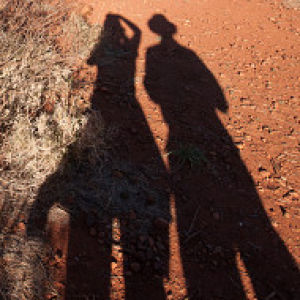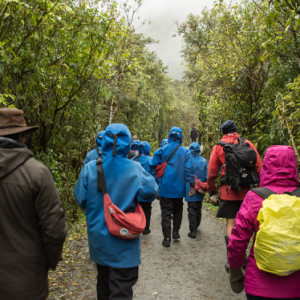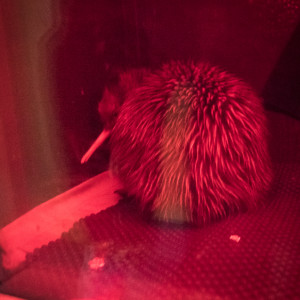Wet Glacier
Today, it has been wet. Very wet.
We were booked on a HeliHike tour at Franz Josef, but unfortunately it was cancelled due to the weather. When we got up, visibility was improved from yesterday and we could see snow capped peaks around us. It then began to drizzle a bit and it's just got worse all day, with some torrential downpours during the afternoon.
We were due to be flown by helicopter up onto the glacier, where we'd do a couple of hour of ice walking. The only alternative available was a walk up the glacial valley towards the face of the glacier, in the rain.
We were kitted out with waterproof boots, nice warm socks, waterproof overtrousers and given lovely orange beanie hats to keep. Then we were driven to the car park and began our walk. Our guide was great, giving us information about the trees, wildlife and glacier. At one point he took an ice axe to the ground to prove that it was a thin layer of stones above ice.
We got to see the face of the glacier through the mist and rain (see main blip) and at that point the entire group hid inside a tent to give us some respite from the rain while the guides passed out hot drinks. I say tent, it was more like a very big waterproof rucksack cover and we all sat on the edges on the inside.
Soon it was time to wander back to the bus and we returned to dry out.
We got back about 2pm, and returned to our room for a change into dry clothes. We then walked a couple of blocks to a cafe for pastries and cake for lunch, and got absolutely drenched again.
From there, we returned to our hotel room, got changed again, and went to the West Coast Wildlife Centre to see kiwi. We booked on a backstage tour and were taken downstairs to see the kiwi that they were hatching.
Kiwi are endangered because of the stoat, which eats the young birds. Stoats were introduced by the Europeans to control the rabbit population. Rabbits were also introduced by the Europeans!
The government take eggs from wild kiwi, and they are reared in captivity until they are about a year old, at which time they are released back into the wild. This increases their chances of survival to about 65%.
We then returned to our hotel room to dry out before heading to the hotel restaurant for dinner.
PS: It's still raining quite hard (hasn't stopped all day) and now the thunder and lightning has started...



Comments
Sign in or get an account to comment.


